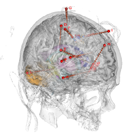The group's main research lines:
The Epilepsy Unit primarily focuses its research on specific aspects of diagnosing the location of epileptic focus, as well as the electrophysiological and cognitive correlates of cerebral records obtained using invasive electrophysiological techniques. They have also undertaken research into clinical pharmacology and comorbidities associated with epilepsy, especially in the field of psychiatry, sleep disorders and sudden death in epilepsy. Descriptions of the research areas:
- Brain connectivity - Electrophysiological study of intracortical evoked potentials to define brain connection pathways as well as their interrelation with functional brain imaging studies, including resting stateand tractography. In this area they cooperate with groups from the Centre for Brain and Cognition (CBC) lead by Prof. Gustavo Deco (UPF), and the group of Prof. Olivier David, at the Institut National de la Sante et de la Recherche Medicale (INSERM, France).
- Electrophysiological correlates of brain cognition - Through invasive recording techniques using microelectrodes it is possible to obtain electrical correlates of brain function at both the structural focus and systems connectivity levels. To this end they have initiated operations with the Synthetic Perceptive, Emotive and Cognitive Systems (SPECS) group, led by Prof. Paul Verschure (UPF) and Dr. Mara Dierssen (UPF) at the Centre for Genomic Research (CRG).
- Clinical pharmacology of epilepsy - By specialising in the treatment of patients with drug-resistant epilepsy, our group has been able to initiate several research projects that are supported by the pharmaceutical industry in the form of grants. These projects focus on determining the effectiveness of new antiepileptic drugs, as well as their side effects and any possible influence they may have on comorbidities associated with epilepsy.
- Comorbidities of epilepsy - The most feared complication of drug-resistant epilepsy is sudden death (SUDEP). For this this reason, we have initiated the first national registry of SUDEP patients in partnership with the Spanish Neurology Society (SEN - Soc. Española de Neurología). The Epilepsy Unit is also the only Spanish centre participating in a multicentre project trying to find SUDEP biomarkers as part of the study "Development of a Predictive Model for Sudden Unexpected Death in Epilepsy (SUDEP) In a High-Risk Population: A Multicentre International Retrospective Case-Control Study”, led by Professors Orren Devinsky (USA) and Philippe Ryvlin (Switzerland)
- Modulation of cerebral activity using electrical brain stimulation -Through cooperation with Dr. María Victoria Puig Velazco (IMIM), we have initiated the development of animal models of epilepsy. One of the objectives is to begin studying the modulation of epileptic activity and behaviour through direct electrical stimulation. Additionally, in collaboration with Dr. Mara Dierssen (CRG), we have begun evaluating brain cognitive functions after direct electrical stimulation.
- Dynamic characterisation of neural systems - The incorporation of Dr. Adrià Tauste Campo into the Epilepsy Group at the IMIM is aimed at developing a dynamic systems research lab for characterising the different stages of epileptic neural activity and the alteration of brain networks in sufferers. The lab's areas of expertise include the study of network changes produced after surgical procedures, as well as electrical modulation through external stimulation using invasive electrodes. To do this, principles of information theory, network models and statistical learning techniques are used. Additionally, in this area the lab will be leading a cooperative effort into the study of single neurone records in human registries with Dr. Rodrigo Quian Quiroga of the University of Leicesterand the analysis of HFOs in human records, with Dr. Liset M. de Laprida from the Ramón y Cajal Institute in Madrid.



